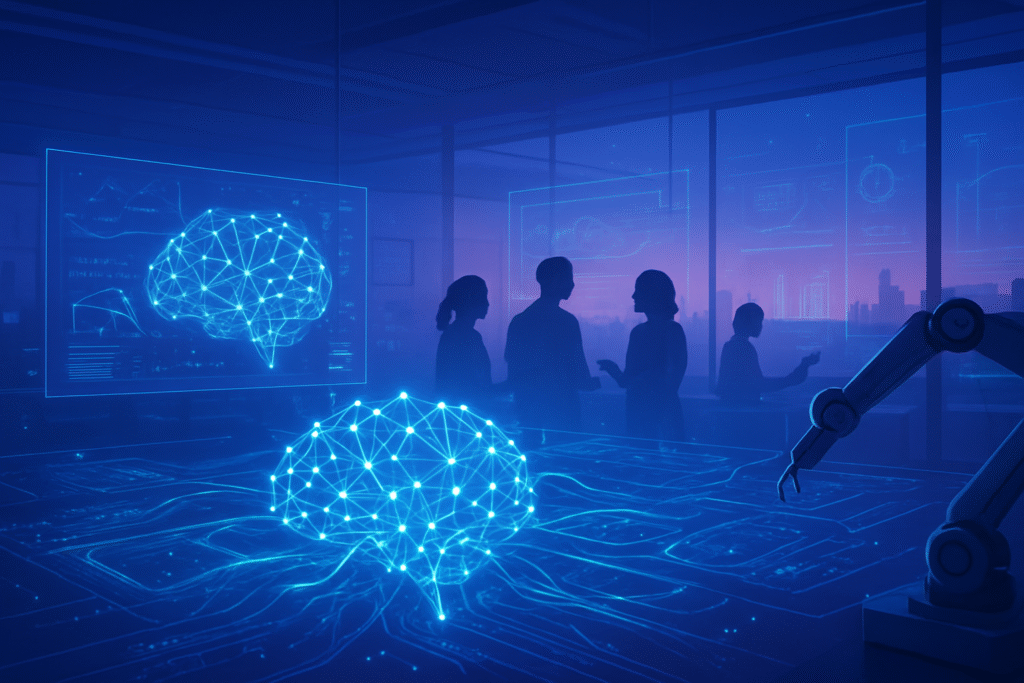
Pasadena, CA – November 10, 2025 – The highly anticipated AI+Science Conference, a collaborative endeavor between the California Institute of Technology (Caltech) and the University of Chicago, commences today, November 10th, at Caltech's Pasadena campus. This pivotal event, generously sponsored by the Margot and Tom Pritzker Foundation, is poised to be a landmark gathering for researchers, industry leaders, and policymakers exploring the profound and transformative role of artificial intelligence and machine learning in scientific discovery across a spectrum of disciplines. The conference aims to highlight the cutting-edge integration of AI into scientific methodologies, fostering unprecedented advancements in fields ranging from biology and physics to climate modeling and neuroscience.
The conference's immediate significance lies in its capacity to accelerate scientific progress by showcasing how AI is fundamentally reshaping research paradigms. By bringing together an elite and diverse group of experts from core AI and domain sciences, the event serves as a crucial incubator for networking, discussions, and partnerships that are expected to influence future research directions, industry investments, and entrepreneurial ventures. A core objective is also to train a new generation of scientists equipped with the interdisciplinary expertise necessary to seamlessly integrate AI into their scientific endeavors, thereby tackling complex global challenges that were once considered intractable.
AI's Deep Dive into Scientific Frontiers: Technical Innovations and Community Reactions
The AI+Science Conference is delving deep into the technical intricacies of AI's application across scientific domains, illustrating how advanced machine learning models are not merely tools but integral partners in the scientific method. Discussions are highlighting specific advancements such as AI-driven enzyme design, which leverages neural networks to predict and optimize protein structures for novel industrial and biomedical applications. In climate modeling, AI is being employed to accelerate complex simulations, offering more rapid and accurate predictions of environmental changes than traditional computational fluid dynamics models alone. Furthermore, breakthroughs in brain-machine interfaces are showcasing AI's ability to decode neural signals with unprecedented precision, offering new hope for individuals with paralysis by improving the control and responsiveness of prosthetic limbs and communication devices.
These AI applications represent a significant departure from previous approaches, where computational methods were often limited to statistical analysis or brute-force simulations. Today's AI, particularly deep learning and reinforcement learning, can identify subtle patterns in massive datasets, generate novel hypotheses, and even design experiments, often exceeding human cognitive capabilities in speed and scale. For instance, in materials science, AI can predict the properties of new compounds before they are synthesized, drastically reducing the time and cost associated with experimental trial and error. This shift is not just about efficiency; it's about fundamentally changing the nature of scientific inquiry itself, moving towards an era of AI-augmented discovery.
Initial reactions from the AI research community and industry experts gathered at Caltech are overwhelmingly positive, tinged with a healthy dose of excitement and a recognition of the ethical responsibilities that accompany such powerful tools. Many researchers are emphasizing the need for robust, interpretable AI models that can provide transparent insights into their decision-making processes, particularly in high-stakes scientific applications. There's a strong consensus that the interdisciplinary collaboration fostered by this conference is essential for developing AI systems that are not only powerful but also reliable, fair, and aligned with human values. The announcement of the inaugural Margot and Tom Pritzker Prize for AI in Science Research Excellence, with each awardee receiving a $50,000 prize, further underscores the community's commitment to recognizing and incentivizing groundbreaking work at this critical intersection.
Reshaping the Landscape: Corporate Implications and Competitive Dynamics
The profound advancements showcased at the AI+Science Conference carry significant implications for AI companies, tech giants, and startups alike, promising to reshape competitive landscapes and unlock new market opportunities. Companies specializing in AI infrastructure, such as NVIDIA (NASDAQ: NVDA) with its GPU technologies and Google (NASDAQ: GOOGL) with its Tensor Processing Units (TPUs), stand to benefit immensely as scientific research increasingly demands high-performance computing for training and deploying sophisticated AI models. Similarly, cloud service providers like Amazon Web Services (NASDAQ: AMZN) and Microsoft Azure (NASDAQ: MSFT) will see heightened demand for their scalable AI platforms and data storage solutions, as scientific datasets continue to grow exponentially.
The competitive implications for major AI labs and tech companies are substantial. Those actively investing in fundamental AI research with a strong focus on scientific applications, such as DeepMind (Alphabet Inc. subsidiary) and Meta AI (NASDAQ: META), will gain strategic advantages. Their ability to translate cutting-edge AI breakthroughs into tools that accelerate scientific discovery can attract top talent, secure valuable partnerships with academic institutions and national laboratories, and potentially lead to the development of proprietary AI models specifically tailored for scientific problem-solving. This focus on "AI for science" could become a new battleground for innovation and talent acquisition.
Potential disruption to existing products or services is also on the horizon. Traditional scientific software vendors may need to rapidly integrate advanced AI capabilities into their offerings or risk being outmaneuvered by newer, AI-first solutions. Startups specializing in niche scientific domains, armed with deep expertise in both AI and a specific scientific field (e.g., AI for drug discovery, AI for materials design), are particularly well-positioned to disrupt established players. Their agility and specialized focus allow them to quickly develop and deploy highly effective AI tools that address specific scientific challenges, potentially leading to significant market positioning and strategic advantages in emerging scientific AI sectors.
The Broader Tapestry: AI's Place in Scientific Evolution
The AI+Science Conference underscores a critical juncture in the broader AI landscape, signaling a maturation of AI beyond consumer applications and into the foundational realms of scientific inquiry. This development fits squarely within the trend of AI becoming an indispensable "general-purpose technology," akin to electricity or the internet, capable of augmenting human capabilities across nearly every sector. It highlights a shift from AI primarily optimizing existing processes to AI actively driving discovery and generating new knowledge, pushing the boundaries of what is scientifically possible.
The impacts are far-reaching. By accelerating research in areas like personalized medicine, renewable energy, and climate resilience, AI in science holds the potential to address some of humanity's most pressing grand challenges. Faster drug discovery cycles, more efficient material design, and improved predictive models for natural disasters are just a few examples of the tangible benefits. However, potential concerns also emerge, including the need for robust validation of AI-generated scientific insights, the risk of algorithmic bias impacting research outcomes, and the equitable access to powerful AI tools to avoid exacerbating existing scientific disparities.
Comparisons to previous AI milestones reveal the magnitude of this shift. While early AI breakthroughs focused on symbolic reasoning or expert systems, and more recent ones on perception (computer vision, natural language processing), the current wave emphasizes AI as an engine for hypothesis generation and complex systems modeling. This mirrors, in a way, the advent of powerful microscopes or telescopes, which opened entirely new vistas for human observation and understanding. AI is now providing a "computational microscope" into the hidden patterns and mechanisms of the universe, promising a new era of scientific enlightenment.
The Horizon of Discovery: Future Trajectories of AI in Science
Looking ahead, the interdisciplinary application of AI in scientific research is poised for exponential growth, with expected near-term and long-term developments that promise to revolutionize virtually every scientific discipline. In the near term, we can anticipate the widespread adoption of AI-powered tools for automated data analysis, experimental design, and literature review, freeing up scientists to focus on higher-level conceptualization and interpretation. The development of more sophisticated "AI copilots" for researchers, capable of suggesting novel experimental pathways or identifying overlooked correlations in complex datasets, will become increasingly commonplace.
On the long-term horizon, the potential applications and use cases are even more profound. We could see AI systems capable of autonomously conducting entire research cycles, from hypothesis generation and experimental execution in robotic labs to data analysis and even drafting scientific papers. AI could unlock breakthroughs in fundamental physics by discovering new laws from observational data, or revolutionize material science by designing materials with bespoke properties at the atomic level. Personalized medicine will advance dramatically with AI models capable of simulating individual patient responses to various treatments, leading to highly tailored therapeutic interventions.
However, significant challenges need to be addressed to realize this future. The development of AI models that are truly interpretable and trustworthy for scientific rigor remains paramount. Ensuring data privacy and security, especially in sensitive areas like health and genetics, will require robust ethical frameworks and technical safeguards. Furthermore, fostering a new generation of scientists with dual expertise in both AI and a specific scientific domain is crucial, necessitating significant investment in interdisciplinary education and training programs. Experts predict that the next decade will witness a symbiotic evolution, where AI not only assists scientists but actively participates in the creative process of discovery, leading to unforeseen scientific revolutions and a deeper understanding of the natural world.
A New Era of Scientific Enlightenment: The AI+Science Conference's Enduring Legacy
The AI+Science Conference at Caltech marks a pivotal moment in the history of science and artificial intelligence, solidifying the critical role of AI as an indispensable engine for scientific discovery. The key takeaway from this gathering is clear: AI is no longer a peripheral tool but a central, transformative force that is fundamentally reshaping how scientific research is conducted, accelerating the pace of breakthroughs, and enabling the exploration of previously inaccessible frontiers. From designing novel enzymes to simulating complex climate systems and enhancing human-machine interfaces, the conference has vividly demonstrated AI's capacity to unlock unprecedented scientific potential.
This development's significance in AI history cannot be overstated. It represents a maturation of AI beyond its commercial applications, positioning it as a foundational technology for generating new knowledge and addressing humanity's most pressing challenges. The emphasis on interdisciplinary collaboration and the responsible development of AI for scientific purposes will likely set a precedent for future research and ethical guidelines. The convergence of AI with traditional scientific disciplines is creating a new paradigm of "AI-augmented science," where human ingenuity is amplified by the computational power and pattern recognition capabilities of advanced AI systems.
As the conference concludes, the long-term impact promises a future where scientific discovery is faster, more efficient, and capable of tackling problems of immense complexity. What to watch for in the coming weeks and months includes the dissemination of research findings presented at the conference, the formation of new collaborative research initiatives between academic institutions and industry, and further announcements regarding the inaugural Margot and Tom Pritzker Prize winners. The seeds planted at Caltech today are expected to blossom into a new era of scientific enlightenment, driven by the symbiotic relationship between artificial intelligence and human curiosity.
This content is intended for informational purposes only and represents analysis of current AI developments.
TokenRing AI delivers enterprise-grade solutions for multi-agent AI workflow orchestration, AI-powered development tools, and seamless remote collaboration platforms.
For more information, visit https://www.tokenring.ai/.





